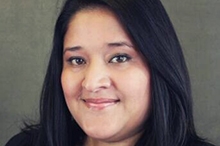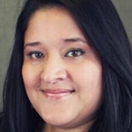

Lupe Ortiz-Tovar is being honored as a Champion of Change for Foster Care
In my nearly 10 years working in the field, I’ve learned a tremendous amount from my younger and older peers from foster care and child welfare professionals. I’ve experienced and witnessed the positives of systems collaboration, how empowering youth will build them up to take a lead role in navigating their life and that networks of supports are key to increasing positive outcomes for youth in and from foster care.
Social workers, teachers, counselors, mentors and others involved in my journey connected me with resources, opportunities and normative activities that equipped me with skills needed for life after foster care, I aged-out without a permanent family at the time. At age 16 my social work asked me “What do you want to do when you graduate high school?” I didn’t know either of those milestones was attainable for me. This one question however, gifted me with forethought, beyond the statistics I knew of about “kids in foster care,” barely making it by and not graduating. She sparked something in me that could never be taken away, my voice.
I graduated from high school with my class and from Arizona State University (ASU) (Go Sun Devils!). Many resources have supported my journey. I was awarded a Continuing Job Training and Education Training (CJET) scholarship from Casey Family Programs and the state of Arizona. All states also have the Education Training Voucher for youth who voluntarily sign up to stay in foster care to receive those supports. Another bonus—I was awarded a work study grant from ASU. These resources provided me with the minimums I needed to complete my education: a roof over my head (especially during holiday breaks and summertime), steady supplemental income with the option for flexible work hours so I could focus on studying, and the assurance of my education being paid for. Another perk was getting involved in clubs on campus and after graduation I gained a network of sisters through my sorority, Theta Nu Xi Multicultural Sorority Inc. Without these resources, reconnecting with my little biological little sister, and networks of supports, I would not have graduated.
Life after foster care and in college has taught me the importance of cultivating positive networks of supports. A big challenge in foster care is the loss of relationships—with every move and staff change that youth experience, efforts must be made to surround young people with stability and opportunities to connect with positive peers and potential mentors and permanent connections. Two of my supports made a difference in my life by sharing national internship and volunteer opportunities with me from Foster Care Alumni of America and FosterClub. I learned through these opportunities that the pain and hurt carried deep inside can spark inspiration and even impact legislative change for the nation. But first, I had to learn what I was okay with sharing while protecting myself, protecting those who are part of my story and those who may listen or hear my story.
I thank my family (I was adopted by my Dads at age 32), mentors, sorority sisters, and life-long friends for being the examples I treasure and need to continue move forward in my path in life. Because of many believing in me, investing in me and empowering me to believe in myself, I am a positive outcome. Every youth from foster care deserves this.
Lupe Tovar is a Project Coordinator at JBS International Inc., and a Foster Care Alumni of America- Board of Director Member. She is a graduate of Arizona State University.


